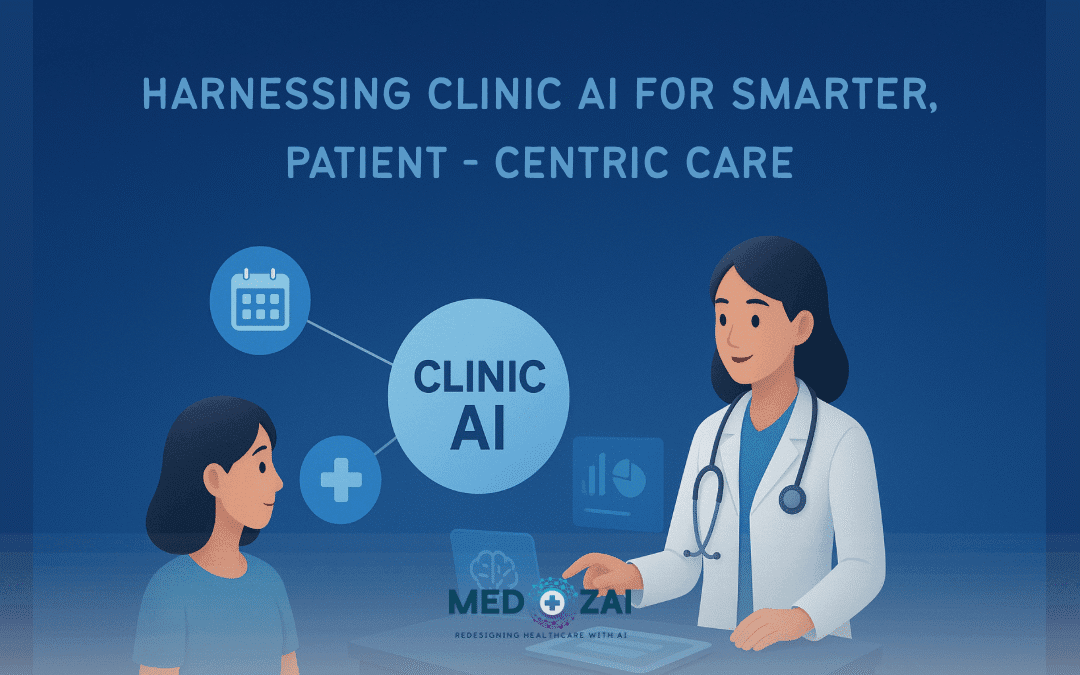Harnessing Clinic AI for Smarter, Patient Centric Care
Healthcare is at a turning point. Rising costs, clinician burnout, and patient expectations are pushing clinics to explore smarter, AI-driven solutions. The following fast facts reveal why Clinic AI is no longer optional, it’s becoming essential.
Fast Facts:
- $150 Billion Lost Annually: Missed appointments cost the U.S. healthcare system an estimated $150B every year, with median no-show rates of 5–7% (MGMA).
- Half a Day on Admin: Physicians spend 49.2% of their office time on EHRs and desk work, plus 1–2 extra hours after hours (Annals of Internal Medicine).
- 340+ FDA-Cleared Tools: Radiology leads AI adoption with over 340 FDA-approved AI solutions already in clinical use (FDA ).
Artificial intelligence (AI) is moving from pilot to production across clinical settings. Clinic AI is the practical application of AI, natural language processing (NLP), machine learning (ML), computer vision and generative AI—inside outpatient clinics and hospitals to automate documentation, improve patient flow, support diagnosis and elevate the patient experience.
This longform guide defines Clinic AI, summarizes peerreviewed and institutional evidence, and shows how Medozai’s solutions align with what works, securely and responsibly.
What is Clinic AI?
Clinic AI embeds AI models directly in clinical workflows. Common categories include:
- Ambient AI scribes that capture the clinician patient conversation and draft notes.
- AI scheduling & patient flow tools that forecast demand, anticipate no shows and trigger reminders.
- Clinical decision support (CDS) that flags risk, triages urgency or suggests next steps.
- Patient engagement assistants (chat/voice) for triage, FAQs, forms and followups.
- Predictive analytics for risk stratification, readmission prediction or screening prioritization.
Why Clinic AI matters
2. Administrative load is heavy:
3. Regulatory traction
What the evidence shows
2. System level impact (pilot + bakeoff data):
3. Radiology & CDS adoption:
4. MIT Jameel Clinic (screening & global network):
5. Mayo Clinic (algorithm pipeline):
Note on claims: Figures above are cited verbatim from sources and are timestamped. Where ranges or adoption rates vary by study/site, we attribute the number to the reporting outlet.
Core areas of Clinic AI
2) AI scheduling & patient flow
3) Clinical decision support & imaging AI
4) Patient engagement & virtual assistance
5) Predictive analytics & population health
Medozai’s approach (Security, Integration, Outcomes)
Measurable benefits
Challenges & how to mitigate
The road ahead
Conclusion
Frequently Asked Questions (FAQs)
1. What is Clinic AI?
Clinic AI refers to the use of artificial intelligence tools in clinics to automate administrative workflows such as scheduling, medical documentation, billing, and patient engagement.
2. How does Clinic AI help reduce missed appointments?
AI-powered scheduling assistants send automated reminders, predict patient no-shows, and optimize appointment slots. According to the AMA, missed appointments cost the U.S. healthcare system over $150 billion annually, and AI tools help reduce these losses.
3. Is Clinic AI secure and compliant with healthcare regulations?
Yes. Reputable Clinic AI systems are built with HIPAA compliance and data encryption. Clinics must verify that vendors meet U.S. and Canadian healthcare data privacy laws.
4. Can Clinic AI improve patient experience?
Absolutely. AI-powered chatbots and engagement tools give patients quicker responses, personalized communication, and smoother clinic visits—helping improve satisfaction and retention.
5. What services can Medozai provide with Clinic AI?
Medozai specializes in AI-driven administrative automation for clinics—covering scheduling, EMR documentation, patient engagement, and compliance—helping U.S. and Canadian clinics save time and cut costs.


Trackbacks/Pingbacks